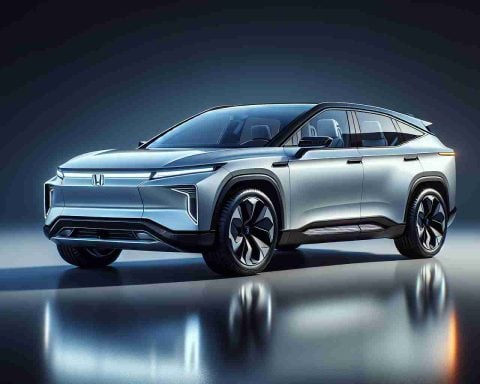The automotive industry is watching closely as significant changes loom on the horizon. Recent developments highlight the intertwining paths of influential business magnate Elon Musk and former President Donald Trump, with potential repercussions for Tesla.
Elon Musk, heavily invested in Trump’s re-election efforts, has been advocating for electric vehicles (EVs) to gain favor with the incoming administration. Surprisingly, Trump, once resistant to EVs, has begun to express a liking for the much-hyped Cybertruck. However, experts warn that this newfound camaraderie may not bode well for Tesla.
Predictions suggest that Trump’s expected policies could severely impact Tesla’s market value, with estimates indicating a possible reduction of up to 40% in profit. Analysts from JPMorgan highlight concerns that the shift in regulatory frameworks under Trump may undermine Tesla’s current business model.
Potential actions include reversing consumer tax incentives for EVs and relaxing stringent emission regulations. Such changes would likely benefit traditional automakers, allowing them to revert to profit-driving gas-powered vehicles while Tesla could be left vulnerable.
While Tesla’s stock has already seen a noticeable decline due to market fluctuations and waning interest in the Cybertruck, the looming shifts in policy could lead to further uncertainties for the EV pioneer as the new administration takes charge.
In this evolving landscape, Tesla’s resilience will be put to the test, and industry insiders are eagerly monitoring the fallout.
The Automotive Industry’s Crossroads: Future Implications of Policy Changes on Electric Vehicles
The automotive industry stands at a critical juncture, impacted by the intertwining dynamics of influential figures such as Elon Musk and former President Donald Trump. Their evolving relationship, particularly around the advocacy for electric vehicles (EVs), carries profound implications for the environment, humanity, and the global economy. As we explore these potential changes, the future of sustainable transportation becomes even more uncertain.
One of the most pressing environmental concerns tied to the shift in policy under a Trump administration is the potential rollback of emissions regulations. Historically, stringent regulations have pushed automakers towards adopting cleaner technologies, which directly benefits the environment by reducing greenhouse gas emissions and improving air quality. If policies pivot to favor gas-powered vehicles, as some analysts predict, this could significantly worsen air pollution and hinder efforts to combat climate change. The stakes are high; the automotive sector is a major contributor to global emissions, and any regression could have cascading effects on public health and biodiversity.
From a humanitarian perspective, supporting the transition to EVs aligns with global efforts to create sustainable urban environments and improve overall health outcomes. Polluted cities contribute to respiratory diseases, which disproportionately affect low-income communities. By undermining incentives for EV adoption, the potential policies could not only stall progress towards cleaner air but also exacerbate social inequalities.
Economically, the fate of Tesla hangs in the balance. The company’s innovative approach has positioned it as a leader in the EV market, yet financial forecasts suggest that the restructuring under Trump could threaten Tesla’s profitability, potentially to the tune of a 40% profit reduction. This shift could stifle investments in green technologies and innovation across the automotive sector, leading to job losses, particularly in EV manufacturing and related industries. Conversely, traditional automakers, who may benefit from relaxed regulations, could shift their focus back to older technologies, further delaying the transition towards sustainable practices.
Globally, the impact of these decisions could influence international efforts toward climate solutions. As the U.S. automotive market adjusts its stance on EVs, international competitors may seize the opportunity to strengthen their green technologies, potentially positioning themselves as leaders in the burgeoning global green economy. The future of humanity relies heavily on collective action towards reducing carbon footprints; any retreat from commitment to EVs could diminish U.S. standing in global climate initiatives, thereby impacting international cooperation efforts.
In summary, the political landscape surrounding the EV industry exemplifies a critical crossroads that intertwines environmental sustainability, economic stability, and humanitarian outcomes. The relationship between policy and the automotive sector transcends mere market dynamics; it reflects a broader commitment to a sustainable future. As we navigate these changes, it becomes essential for stakeholders—be they governments, businesses, or citizens—to advocate for policies that prioritize the environment and humanity at large, rather than short-term economic gains.
How Trump’s Return Could Impact Tesla’s Future: What You Need to Know
The Potential Impact of Political Shifts on Tesla
As the automotive industry braces for significant changes, the ongoing relationship between Elon Musk and Donald Trump has drawn considerable attention. Musk’s investment in Trump’s re-election campaign reflects his strategic alignment with political forces that could dramatically alter the landscape for electric vehicles (EVs), particularly for Tesla.
Key Developments and Predictive Outcomes
1. Changes in Regulatory Framework
Predictions from industry analysts suggest that a Trump administration might roll back consumer tax incentives that currently bolster EV sales. This could create a challenging environment for Tesla, which relies heavily on these incentives to maintain competitiveness against legacy automakers.
2. Easing Emission Standards
Analysts are particularly concerned about the potential relaxation of emission regulations. Such changes could enable traditional car manufacturers to focus on more profitable gas-powered vehicles, potentially sidelining Tesla’s market advantages built on stringent environmental regulations.
3. Market Value Risks
JPMorgan analysts project a significant risk to Tesla’s market valuation, estimating a possible drop of up to 40% in profit. This prediction highlights the volatility Tesla may face if Trump’s administration favors conventional automotive practices over innovative EV solutions.
Pros and Cons of Political Collaboration
Pros:
– Policy Advocacy: Musk may use his influence to advocate for favorable policies that could indirectly benefit Tesla if aligned correctly.
– Market Awareness: Increased media attention could raise overall interest in EVs and Tesla’s innovative products.
Cons:
– Loss of Incentives: The potential loss of tax credits could deter new customers, adversely impacting sales.
– Competitive Disadvantages: A shift back to gas-powered vehicles could increase competition against Tesla without the same regulatory hurdles.
Trends and Innovations in the EV Market
Current Trends:
– Sustainable Technology: Despite the looming uncertainties, the EV sector is witnessing innovations in battery technology and sustainability efforts, which remain critical for future growth.
– Consumer Preferences: Reports indicate consumer preferences are shifting favorably towards EVs; however, policy reversals could stall this momentum.
Use Cases for Tesla’s Resilience
Tesla’s focus on software updates and autonomous driving technology creates a unique value proposition that may still attract a dedicated consumer base, regardless of political changes. Its continued investment in energy solutions and battery lifecycle management represents potential growth avenues that could sustain its market position.
Limitations and Challenges
Despite its current strengths, Tesla faces inherent limitations:
– Pricing Pressures: As competition increases, especially from established automakers entering the EV space, Tesla’s premium pricing strategy could be challenged.
– Supply Chain Risks: The global supply chain issues and fluctuations in raw material prices could impact production capabilities.
Conclusion
The intersection of politics and the automotive industry presents a complex scenario for Tesla and its stakeholders. While there are both challenges and opportunities, the company’s ability to navigate regulatory shifts and market dynamics will be critical to its continued success in a highly competitive landscape.
For more insights on the automotive industry and its future, visit Reuters.


















